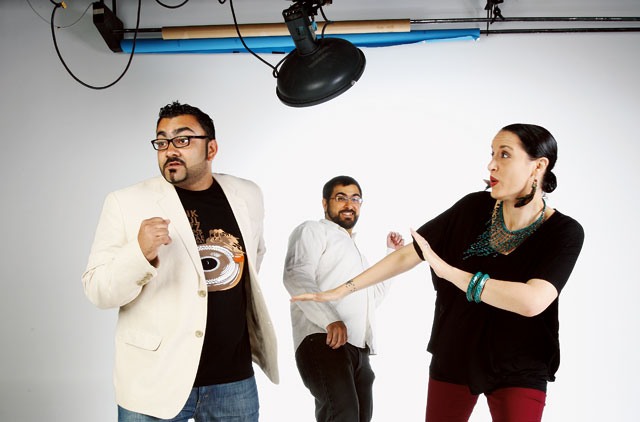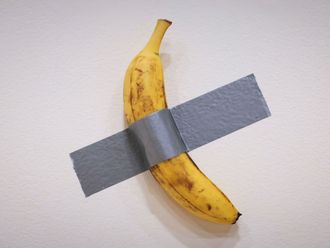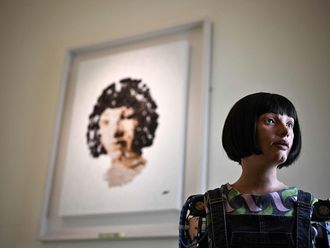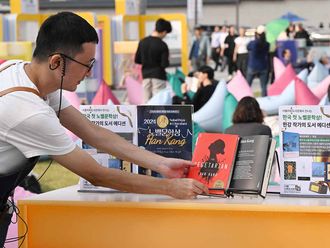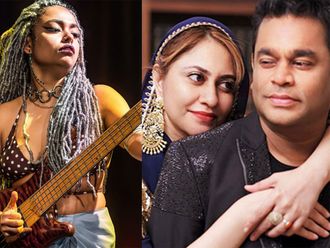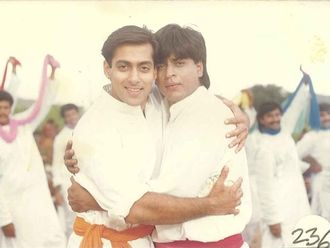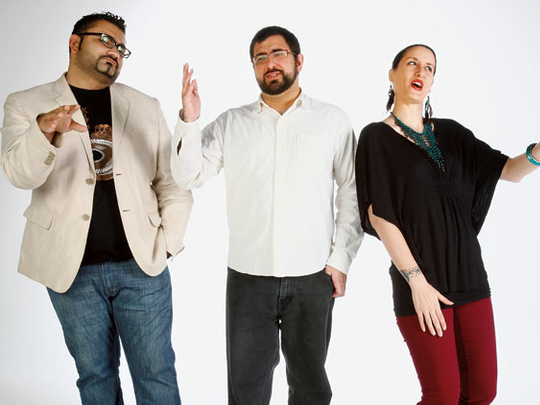
"Some day I'd like to see a proper, developed comedy circuit here in Dubai, with a festival like they have in Edinburgh. That's the dream."
Omar Ismail, an emerging stand-up comedian based in Dubai, is speaking enthusiastically about his high hopes for the city's burgeoning comedy scene. Until recently his comments might have provoked laughter - of the derisory sort. Now, though, with comedy nights springing up in venues across the city, and a glut of have-a-go humorists eager to give stand-up a shot, his dream no longer seems so far-fetched.
Comedy has always played a prominent role in Middle Eastern entertainment, albeit on slapstick television shows and the theatre, particularly in Egypt. But it is only in the past three to four years that a handful of home-grown artists has pushed the scene in the UAE, determined to forge a community that doesn't rely on imported talent.
As a graduate of Dubomedy, an organisation that has run comedy classes and put on events in Dubai since 2007, Ismail, a UAE national born and raised in Newcastle, England, stresses the importance of getting his fellow Emiratis involved in the scene.
"Whilst I love expats getting involved, and it couldn't be done without them, the problem is always going to be that at some point they'll leave," he explains.
"And with improvisation comedy for example, where you're part of a troupe, I can't build up a 20-year career if no one is going to stay for more than three or four years. We've already lost a lot of good Dubai-based people who have gone to forge careers elsewhere."
Ali Al Sayed, who co-founded Dubomedy with his now-wife Mina Liccione, agrees, saying that his goal from the very beginning was to create "a base, a community" on which they could build a regular circuit.
"We fly in comedians from the UK and from the US, but when you put on a comedian like Russell Peters, the funniest bits are the first ten minutes when he's talking about Karama and Jumeirah, the stuff people here can really relate to," says Al Sayed.
"Sure, there's pop culture, the stuff that everybody knows, but when you can relate to things that are happening in your everyday life, it's funnier. So for us it's about building a community on two levels: on the artist's level and on the audience level… For the longest time, growing up here in Dubai, you'd go to different shows and find different social groups. Right now, you find different groups hanging out together. And the goal all along was to bring people from different backgrounds and get them into a room to laugh about the same things."
It's a goal that seems all the more achievable when you attend one of Dubomedy's events and look at the audience. A recent evening for novice stand-ups in the World Trade Centre branch of the restaurant Wild Peeta was packed with various nationalities. Abaya-clad Emirati women stood alongside expats of various nationalities and the ages ranged from 16 to 60. More often than not, everyone laughed at the same jokes.
Al Sayed looks happy when I tell him that I was pleasantly surprised by the standard. "I remember a few years ago it took us 13 months to convince a venue to let us do comedy on their worst night ever," he says. "Fast forward to three years later and everything's changed."
But can a place with so many cultural restrictions ever be conducive to a comedian's creativity and growth?
Are UAE-based comedians daunted by the number of topics that are strictly off-limits? A one-hour stand-up set can't consist entirely of mildly offensive mother-in-law jokes.
When I asked Nitin Mirani, one of Dubai's best known stand-ups, who has also performed in Kuwait, the Maldives, for the US Army and in his native India, he said that it wasn't necessarily a disadvantage.
"There's a lot of discipline that comes with performing here. If you use the F-word you're out," he says. "So that pressure helps you with your vocabulary, because you have to come up with alternatives.
"The Middle East is one of the few places where they pay you not to say things," he laughs. "Sometimes if you get told not to say a certain expletive, you come up with an even funnier alternative.
"There are certain cultural barriers that do not allow comedians to be as open-minded as they would want to, but I respect that."
Salman Qureshi, another locally based stand-up who runs his own improvisation classes, as well as Urdu language comedy classes, agrees. "The first time I worked here I was told to be careful with themes like sex, religion and politics," he says. "And I was like, what's left? That's the bread and butter of comedy! But there are a lot of things you can still talk about. It forced me to take a look around and think about observational humour and our own lives. And that's where a lot of the best comedy comes from - from your own personal experiences. And there's a lot of it in Dubai - common things like customer service and traffic. Everybody has a different story about it."
Qureshi also touches on Al Sayed's views about the mixed audiences of Dubai, insisting that it can hone your comedic skills more than if you were performing for a niche audience.
"If you can get the general audience with mixed nationalities to laugh, then your jokes would work in most places. It's arguably easier to do it for an audience such as at the Laughter Factory. It's very British humour - good for them, they cater specifically to that audience - but I'd like to see them try a more mixed audience and see whether it works or not."
I asked Liccione - who is hailed by many as "Dubai's First Lady of Comedy" - whether being a female comic meant she had to tread even more carefully than her male counterparts.
"In the USA, no. Here, sometimes," she says. "There are definitely many more restrictions here in general, but in all honesty I don't mind them. It's all about how you look at it. I look at the restrictions as a challenge to be more creative."
What all the comedians I spoke to had in common was that they'd given up their jobs - often well-paying ones - to pursue their stand-up dream.
For Nitin Mirani, who has been performing regularly for several years now, it was a leap of faith that is starting to pay off.
For others, such as Omar Ismail, who has been performing for little more than a year, he's uncertain whether he'll be able to earn a living from his passion. He saved enough money from his previous IT job to be able to concentrate entirely on stand-up for 18 months. But he admits he might have to return to work at least part-time in the near future.
"I was considering going back to the UK this year," Ismail says. "What I want to do is try the UK comedy circuit. I'm not sure how long I want to do it for, because I'd like to come back to the UAE and help build a community here, rather than just take part in the one there.
"You have to be doing stuff outside the country too. The circuit here isn't strong enough yet."
Some doubt that it will ever be. Gail Clough, who is in charge of Dubai's long-running Laughter Factory, says that Dubai will never have a fully fledged comedy circuit "because it isn't a major city".
She explains, "There are 200 clubs in London. You need to have all the different clubs and the small, tiny rooms [hosting comedy nights] that they have."
As for whether she would be willing to feature any local talent at the Laughter Factory, she seems unenthusiastic to say the least. "There isn't a circuit for them to learn on. They have to be somewhere like London or Los Angeles," she says.
"They have to locate there so they can develop their skill. I don't mean to be negative or harsh. I'm just trying to be honest. How are you going to get good if there's no circuit to work on? If they're really serious about being a comedian they'll have to move."
Asked what he thought about Clough's comments, Salman Qureshi said he felt local comedians should at least be given a chance to perform alongside the comedy heavyweights the Laughter Factory regularly hosts.
"I feel that the talent of locally based artists is grossly underestimated," he said. "It would be nice to see established places like the Laughter Factory give opportunities to UAE-based comedians - after scouting them of course. This would make economic and business sense, along with giving back to the community here. I have a strong belief that they would be pleasantly surprised by what they might find."
Asked whether she was optimistic about the future of comedy in Dubai, Liccione says she has never been anything but.
"It has been incredible to watch the local comedy grow so much. We went from zero to a functional comedy circuit in four years. It is unbelievable. Our dream was to be able to train local comedians and help get them to a professional enough level where we can then starting exporting talent rather than importing it. Over the last few years we have done just that."
Liccione adds that this year, she, Al Sayed and three of Dubomedy's graduates will be taking the first UAE-produced comedy show to the Edinburgh Fringe Festival. She's clearly proud of her achievement, and of proving the doubters wrong. "When we first started everyone was sceptical. No one wanted to take a chance on local comedy. They thought either there wouldn't be talent or the content would be too dirty. When we said that we didn't do dirty jokes, they said it wouldn't be funny without dirty jokes. We had to prove ourselves and not take no for an answer.
"It took us a year to find a venue that would host the first weekly, locally based comedy night. Now the phone rings off the hook asking us to do weekly comedy nights at numerous venues. Comedy is booming in the UAE and it will continue to grow."
Ismail, too, is optimistic, admitting that although he doesn't think Dubai could ever emulate the scale of Edinburgh's festival, it could host a major event.
"Even if people came from all over the world it would be a struggle," he says. "But maybe a thousand acts. That would be fantastic. To have a two- or three-day festival. Honestly, I do think we're getting there."


